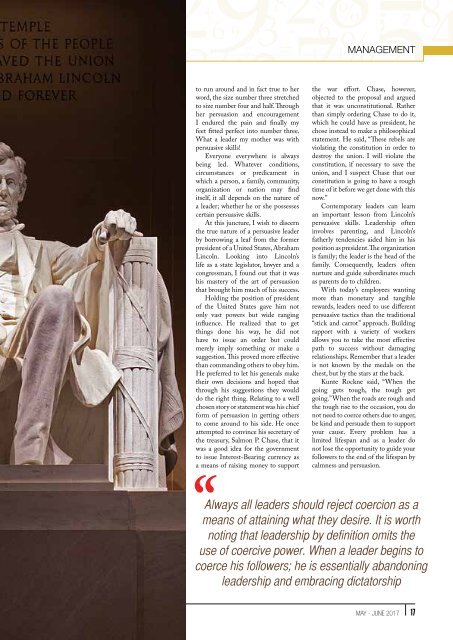The Accountant-May-June 2017
You also want an ePaper? Increase the reach of your titles
YUMPU automatically turns print PDFs into web optimized ePapers that Google loves.
Management<br />
to run around and in fact true to her<br />
word, the size number three stretched<br />
to size number four and half. Through<br />
her persuasion and encouragement<br />
I endured the pain and finally my<br />
feet fitted perfect into number three.<br />
What a leader my mother was with<br />
persuasive skills!<br />
Everyone everywhere is always<br />
being led. Whatever conditions,<br />
circumstances or predicament in<br />
which a person, a family, community,<br />
organization or nation may find<br />
itself, it all depends on the nature of<br />
a leader; whether he or she possesses<br />
certain persuasive skills.<br />
At this juncture, I wish to discern<br />
the true nature of a persuasive leader<br />
by borrowing a leaf from the former<br />
president of a United States, Abraham<br />
Lincoln. Looking into Lincoln’s<br />
life as a state legislator, lawyer and a<br />
congressman, I found out that it was<br />
his mastery of the art of persuasion<br />
that brought him much of his success.<br />
Holding the position of president<br />
of the United States gave him not<br />
only vast powers but wide ranging<br />
influence. He realized that to get<br />
things done his way, he did not<br />
have to issue an order but could<br />
merely imply something or make a<br />
suggestion. This proved more effective<br />
than commanding others to obey him.<br />
He preferred to let his generals make<br />
their own decisions and hoped that<br />
through his suggestions they would<br />
do the right thing. Relating to a well<br />
chosen story or statement was his chief<br />
form of persuasion in getting others<br />
to come around to his side. He once<br />
attempted to convince his secretary of<br />
the treasury, Salmon P. Chase, that it<br />
was a good idea for the government<br />
to issue Interest-Bearing currency as<br />
a means of raising money to support<br />
the war effort. Chase, however,<br />
objected to the proposal and argued<br />
that it was unconstitutional. Rather<br />
than simply ordering Chase to do it,<br />
which he could have as president, he<br />
chose instead to make a philosophical<br />
statement. He said, “<strong>The</strong>se rebels are<br />
violating the constitution in order to<br />
destroy the union. I will violate the<br />
constitution, if necessary to save the<br />
union, and I suspect Chase that our<br />
constitution is going to have a rough<br />
time of it before we get done with this<br />
now.”<br />
Contemporary leaders can learn<br />
an important lesson from Lincoln’s<br />
persuasive skills. Leadership often<br />
involves parenting, and Lincoln’s<br />
fatherly tendencies aided him in his<br />
position as president. <strong>The</strong> organization<br />
is family; the leader is the head of the<br />
family. Consequently, leaders often<br />
nurture and guide subordinates much<br />
as parents do to children.<br />
With today’s employees wanting<br />
more than monetary and tangible<br />
rewards, leaders need to use different<br />
persuasive tactics than the traditional<br />
“stick and carrot” approach. Building<br />
rapport with a variety of workers<br />
allows you to take the most effective<br />
path to success without damaging<br />
relationships. Remember that a leader<br />
is not known by the medals on the<br />
chest, but by the stars at the back.<br />
Kunte Rockne said, “When the<br />
going gets tough, the tough get<br />
going.” When the roads are rough and<br />
the tough rise to the occasion, you do<br />
not need to coerce others due to anger,<br />
be kind and persuade them to support<br />
your cause. Every problem has a<br />
limited lifespan and as a leader do<br />
not lose the opportunity to guide your<br />
followers to the end of the lifespan by<br />
calmness and persuasion.<br />
Always all leaders should reject coercion as a<br />
means of attaining what they desire. It is worth<br />
noting that leadership by definition omits the<br />
use of coercive power. When a leader begins to<br />
coerce his followers; he is essentially abandoning<br />
leadership and embracing dictatorship<br />
MAY - JUNE <strong>2017</strong> 17

















